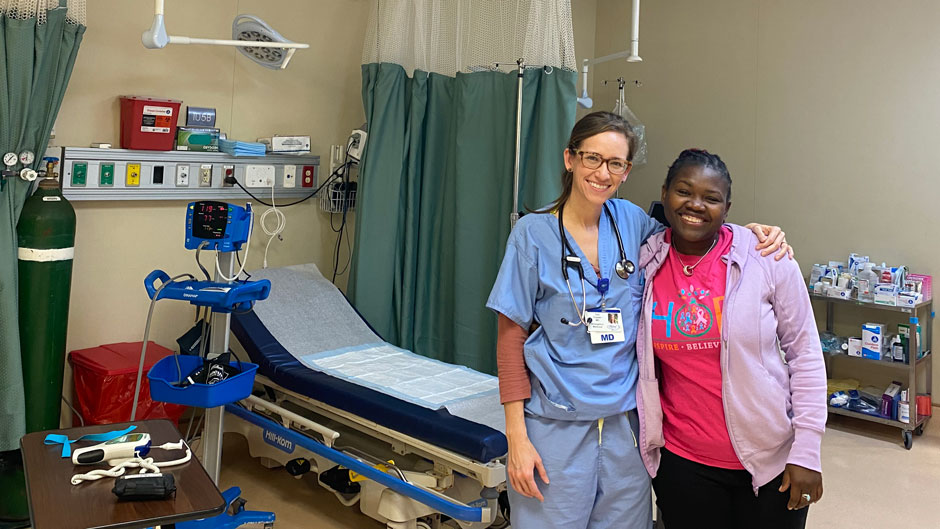From her home in St. Louis, Dr. Tara Conway Copper watched news reports of Hurricane Dorian barreling across the Atlantic Ocean toward the Bahamas, and a possible Florida landfall.
Her parents, John and Maureen Conway, were hunkered down in Nassau on New Providence Island. Her younger sister, Jena Conway, was in Fort Lauderdale. When Dorian hit the northern islands of the Bahamas and stalled over Grand Bahama Island and Great Abaco Island, battering the islands with winds peaking at 185 mph, huge storm surge, and unpredictable tornadoes, Copper wondered how the people there would survive.
“I just couldn’t fathom what it must have been like on the ground,” she said.
Copper is in the Bahamas now, spending a week helping out at the Marsh Harbour Healthcare Clinic in the heart of Great Abaco Island. A University of Miami Miller School of Medicine alumna, Copper is the first alumni to be part of a rotation of University of Miami physicians spending week-long stints at the clinic to help doctors there provide treatment to local residents returning to the stricken island.
Copper, a 2010 graduate of the Miller School of Medicine, is an assistant professor of pediatrics at Washington University School of Medicine in St. Louis and works in the emergency room at the St. Louis Children’s Hospital.
Before attending the University of Florida for her undergraduate studies, Copper lived and went to high school in Nassau for two years in the late 1990s and her parents still call the Bahamas home.
“The Bahamas have always been warm and welcoming to me and my family since we first came here in 1997,” she said in an interview Saturday. “It was a no brainer that I had to figure out a way to get back here and help the people after Dorian.”
After Hurricane Dorian hit the Bahamas on Sept. 1, Copper shared relief agency websites with Washington University colleagues who wanted to donate to recovery efforts. She reached out to her family and friends in Nassau, trying unsuccessfully to find someone who could connect her with volunteer efforts on the ground.
“I felt my hands were a little bit tied and that I couldn’t find a way in,” she said.
She found the way last month when she checked the Miller School Facebook page to get information about her 10 year reunion. There, she saw a post by classmate Dr. Elizabeth Greig, who was asking if anyone was interested in volunteering in Marsh Harbour.
Greig, along with Dr. Barth A. Green, executive dean of global health and community service at the Miller School of Medicine, have spearheaded efforts to help in the Bahamas and have been working closely over the past four months with the Bahamas Ministry of Health to coordinate resources.
Copper is the sixth doctor associated with the University to volunteer at Marsh Harbour, and an additional three doctors will deploy next week, Greig said.
“The Bahamian workforce is still depleted, housing remains a critical issue, and the University of Miami volunteers are helping to offset some of the burden on the Ministry of Health so they can regroup and put together a working plan for the Abacos healthcare workforce that will be sustainable long term without outside assistance,” Greig said.
When Copper arrived in Marsh Harbour Jan. 1, it was her first visit to the town. She was struck by the devastation on the island, which is facing a herculean effort to rebuild.
“Every single building I have seen was severely damaged,” she said. “It just seemed so upside down.”
At the Marsh Harbour Healthcare Centre, Copper has been working the overnight shift, treating a steady stream of patients for various ailments, including ear and skin infections, congestive heart failure, and hypertension, as well as mental health conditions including depression and schizophrenia. With the holiday season concluded, the medical team expects additional patients from construction injuries as workers return to assist in the rebuild.
Greig said the number of patients to the clinic is now the highest it’s been since the hurricane as more and more people return. The University and Ministry of Health are working on a long term strategy for a recovery and rebuild that not only involves our medical school, but the School of Nursing and Health Studies, School of Architecture, College of Engineering, and Department of Public Health, she noted.
Additional alumni volunteers, Greig said, will also be sought to help fill needs.
Copper said her experience at the clinic has been inspiring.
“I’m just in awe of the team and their work ethic,” said Copper, who is remaining at the clinic until Jan. 9. “Many of them are on their second or third tour of duty at the clinic. I feel blessed to be able to offer a skill set that is needed.”

